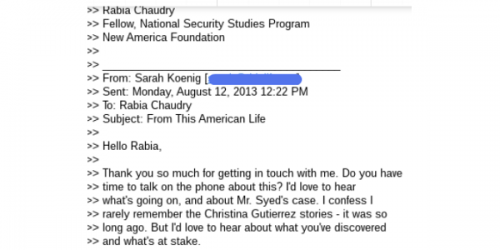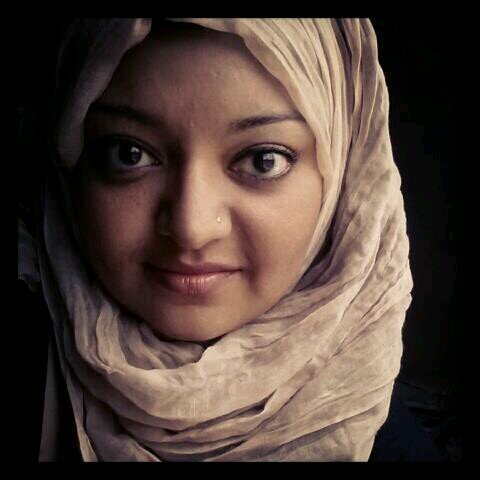
by Atiya Hasan
From Sesame Street’s Bert, to the Stephen Colbert show, The Rolling Stone and many global listening parties, everyone is drawn to the seat-gripping podcast, “Serial,” that has put storytelling back in style. It’s no wonder that “Serial” has been given the noteworthy title of being “the most downloaded podcast in history,” with more than five million listeners on iTunes and counting.
It goes without saying, the BG staff has not been immune to the “Serial” fever either.
I must admit, the reason I was drawn to it initially was because of the Muslim-American central character, Adnan Syed, who is currently serving a life sentence at a Western Maryland state prison for the 1999 murder of his ex-girlfriend Hae Min Lee, a high school student in Baltimore County, Maryland.
With the release of the last episode tomorrow, I jumped at the opportunity to speak to Rabia Chaudry, who plays an integral part in all of this, because without her first email to host and executive producer, Sarah Koenig, “Serial” would have never materialized and generated the widespread fixation that it has.

For those not yet addicted to listening to the podcast weekly, Koenig first learned about the mysterious case more than a year ago, and since then, she has sorted through box after box of legal documents and investigators’ notes, listening to trial testimony and police interrogations, and most importantly, fact-checking every detail to the case. Each episode consists of stories retold by Syed, his friends, alibis, ex-friends, acquaintances and anyone else who can remember details from the day of the crime, January 13, 1999.
Fifteen years later, and after much deliberate research, Koenig realizes the trial covered up a far more complicated story, unheard by the jury or the public. She shifts through the evidence, and digs deep into Syed’s mind and heart by asking him pressing questions, in the hopes of putting together his stories to either catch him in a lie or prove his innocence.
According to the Website, “all of it leads back to the most basic questions: How can you know a person’s character? How can you tell what they’re capable of?”
Koenig, a veteran reporter and “Serial’s” narrator, does a fine balancing act of never letting the listener be too sure of which side of the verdict she is on. There is even an entire subReddit dedicated to “Serial“ with fans on both sides, arguing and dissecting the facts of the case.

In the first episode of “Serial,” Chaudry is referred as the older sister of Syed’s best friend, named Saad. It is clear from the clips of the interview that Chaudry is very passionate about this case. I wanted to know more about the personal connection she had with Syed, so I asked her about the most profound memory she had of him.
When I separated from my first husband in 2001 and was going through a child custody battle, and I told Adnan (I had never mentioned my marital troubles to him before), he said ‘Rabia I’m so sorry, I cannot imagine the pain you must be going through.’ I’ll never forget his level of empathy for me, as a kid who has been locked up for life. I remember thinking how surreal it was that he was comforting me, how small my problems really were, and how big his heart is.”
Having a family friend unexpectedly convicted of murder is a life-changing experience regardless of age, so I wanted to know how Syed’s case affects Chaudry on an everyday basis.
The case hasn’t affected my personality as much as my life circumstances have affected my personality and how I approach Adnan’s case. I’ve toughened up a lot in the past 15 years, developed the confidence to speak and write about any issue I feel strongly about, and grow a skin thick enough to take the heat that inevitably comes with speaking or writing publicly. A decade ago, had I turned the case over to a journalist, I would have stayed in the background and not asserted Adnan’s narrative. But now I’m at a point in my life and career that I refuse to back down, even when folks at ‘Serial’ didn’t like that I’m blogging along, and have the social media skills needed to spread his story.”
The way the audience has responded to “Serial” has been unprecedented. The attention and the following it has achieved, that too for a podcast, is remarkable.
I am very grateful for the attention, even the bad attention, because it means that people recognize something went very wrong in this case. That lots of things went very wrong in this case. I wasn’t expecting the attention and I know Sarah wasn’t either. Everyone involved has been pretty amazed.”
I was less interested in the telling of the story or its audience (actually I had no idea how big the audience would be or how the story would be told) and more interested in what Sarah could dig up as a journalist. Those close to the case can’t investigate the way a journalist can, we can’t contact witnesses, police, prosecutors, etc. I was hoping she would uncover facts that would help his chances at exoneration.”
As a graduate of the George Mason University School of Law, Chaudry has been a practicing lawyer for more than a decade and that’s why her point of view of Syed’s case was so important to me. Despite the personal connection, I figure her professional background would urge her to keep up a level of objectivity. I asked her if Koenig had uncovered any details she had previously been unaware of and how this affected her understanding of the case.
I knew most of the details, which is why I insisted a journalist look into the case – so much of it was so wonky and ridiculous that it was very fishy. Sarah’s interview with Asia [Syed’s classmate who claims she saw him at the public library at the time the murder supposedly took place] floored me, because it came after the post conviction hearing where the former prosecutor testified that Asia had been pressured into writing the documents. The fact that no phones existed at BestBuy floored me. I never knew who Summer was and hearing her interview was surreal – that Sarah tracked down an entire host of people who were never contacted by the police/defense is itself a testament to her work and their failures.”
From the victim’s point of view, Lee’s family has stayed silent on the podcast, except for this guy on Reddit who claims to be Lee’s younger brother (for the record, he sounds disgusted by the fact that the case is being “blasted to 5 mil listeners”).
I am sure it’s very painful for them to watch their daughter’s murder being discussed in tens of thousands of forums and looked at by millions of eyes. But I also think it may be painful for them to realize that an innocent boy went to jail for it and that the real killer is still out there.”
Finally, since Syed is in prison, he is not able to listen to the podcast, but receives transcripts of it and is aware that the podcast exists.
So far he has been thankful for Sarah’s work on the case, even when he is conflicted on their relationship. It does stress him out, as it would anyone, not to know if she is genuine when she shows friendship, or if it is all a manipulation. Her investigation has breathed new life into his case, so for better or worse, he is more hopeful than he has been in a while.”
The podcast may be coming to an end tomorrow and many fans are foreshadowing that the episode will leave a lot of loose ends. So here are some affirming words from Chaudry to keep in mind as you listen to the last podcast.
The end of ‘Serial’ is not the end of the case. Lots of things are happening on the legal scene and we are soon starting our grassroots campaign for his support. This show is just the beginning of the end of Adnan’s ordeal, God willing.”
The final message Chaudry would like us all to take home from “Serial”:
That an innocent boy lost half his life because of a corrupt, shoddy prosecutorial system, and that if Adnan was their brother, son, friend, they wouldn’t and shouldn’t stand for it either.”
If you’re also intrigued by the “Serial,” and have lots to say, comment below!
[divider]
 Atiya Hasan is the Editor in Chief at Brown Girl Magazine. She currently lives in Bishkek, Kyrgyzstan where she is finishing up her last semester of medical school. She is all about female empowerment through education and understanding of their rights and sexuality. She is scheduled to be published in an upcoming anthology titled “Faithfully Feminist: Jewish, Christian, and Muslim Feminists on Why We Stay” and is part of the I Speak for Myself series. In her free time, Atiya enjoys consuming large amounts of chocolate and TV shows.
Atiya Hasan is the Editor in Chief at Brown Girl Magazine. She currently lives in Bishkek, Kyrgyzstan where she is finishing up her last semester of medical school. She is all about female empowerment through education and understanding of their rights and sexuality. She is scheduled to be published in an upcoming anthology titled “Faithfully Feminist: Jewish, Christian, and Muslim Feminists on Why We Stay” and is part of the I Speak for Myself series. In her free time, Atiya enjoys consuming large amounts of chocolate and TV shows.




